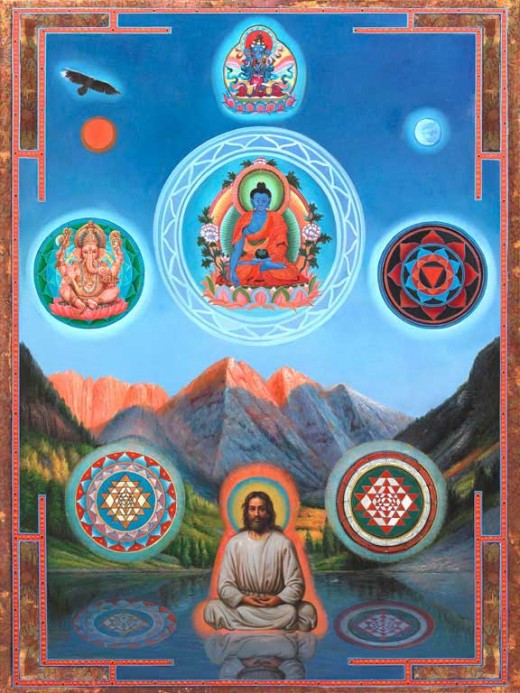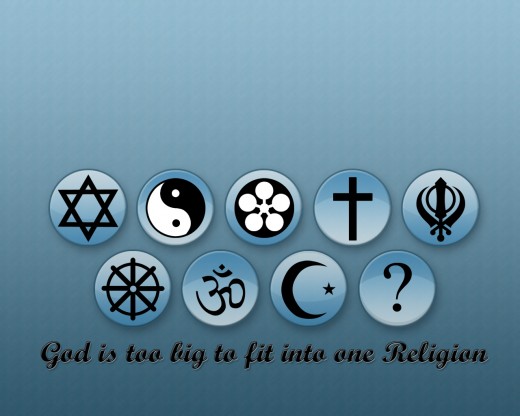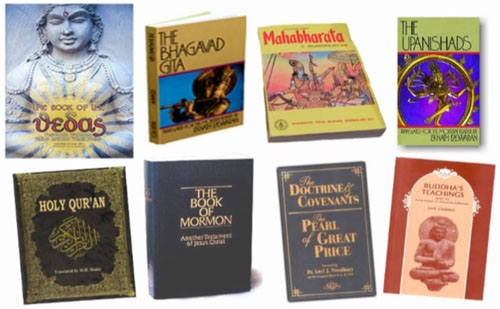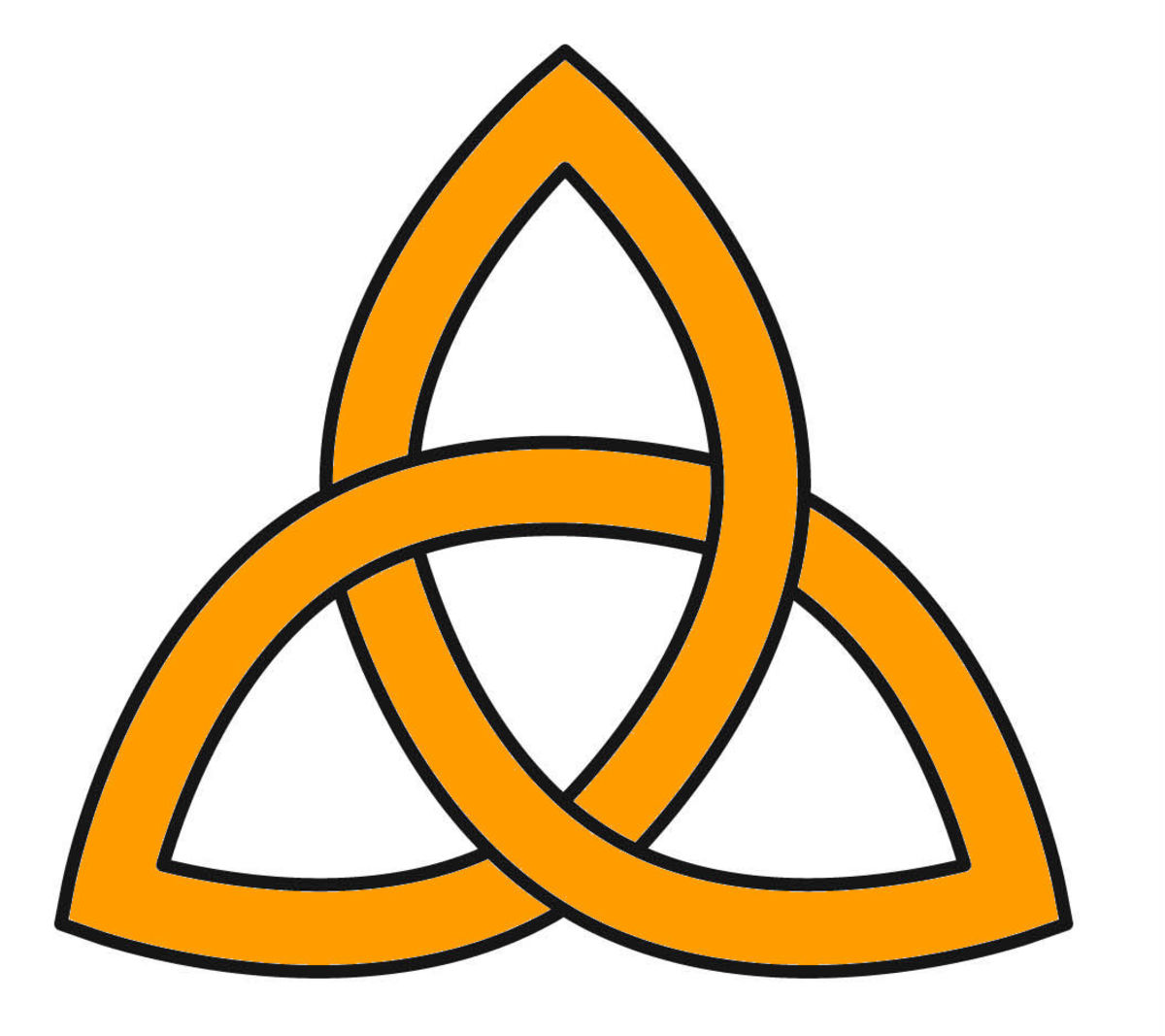Is Every Person Created Religious?

Henry R. Van Til once wrote, "For man, in the deepest reaches of his being, is religious; he is determined by his relationship to God. Religion, to paraphrase the poet's expressive phrase, is not of life a thing apart, it is man's whole existence." Every human being has the sense of something ultimate and absolute, and their lives bear recognition of that fact. While Christianity differs from other religions in very major ways—and I am in no way trying to minimize those differences—it also has similarities to all other religions. Each is made up of people who want to worship something or someone with the belief that in doing so, salvation can be found. From there, the divergences of belief and practice vary significantly, of course, but this basic thing is common to all religions.

What I believe:
I have been researching, studying, and deciphering the books of many religions off and on for many years. I find there are truths in every book. This is why I simply can not convert to any one religion. The understanding is that religion is merely a voluntary action on the part of individuals, who engage in certain practices or rituals in an effort to make themselves better people or to earn their own salvation. I disagree. I believe that "religion" is an organized process from people who want to take power, take money and force people into believing what they want them to believe. Is that the Church? No. I think a conjugation of people getting together to listen to an interpretation of the book of their preference is not religion. To say you are Christian or Catholic or Jewish or Muslim is simply stating your beliefs in the book of your preference. It's when the people who have control over the church that you are a member of and they build on things that are not related to the book of your preference. I will not give examples for respect out of all people who believe in what they believe. But in some "religions" it is quite apparent that the belief system is beyond the Word of God and therefore not, in my opinion, following the gospel in which it was written. I think that the gospels were found, they were in a language that is unknown to us, translated into yet again a different language and then yet again translated into what we have today. In the process of this translation, biblical scholars lost the real interpretation and therefore divided the thoughts of believers and then came religions. Religion is not whether or not you believe but rather how you wish to interpret the gospels. If you have looked into all of these religions you will find that they stand in very similar aspects of each other. You have some people who believe that Jesus was the Son of God and has forgiven us for our sins and some who believe that Jesus was simply a messenger of the Word. Whether or not he died in a sacrifice to forgive us for our sins he was still the one chosen to deliver the Word of God. The man hung on a cross with his hands and feet nailed in, stripped naked, was beaten and scorned, ridiculed, struck in the side with a spear and still didn't deny anything. You gotta give him props for that. Come on now. The words of God do not change whether or not Jesus died or not, whether he was the Son of God or not. Some even speculate whether the word resurrection is another term for resuscitation. That Jesus didn't really die. When given the sour wine it was just an anesthetic to relieve his suffocating symptoms and he revived in his "resurrection". Doesn't deny the fact the Words of God were still spoken. It is the simple things like this that has caused rivalry between religions. Religion is the main cause of wars within countries. People are battling and killing each other over a misinterpretation of a book written centuries before our time. Books that were written based on "visions" of prophets and disciples. Some books written up to 200 years after the death of Jesus.

Different Religions Around the World
My beliefs are based on what I have read concerning many religions. The ones made famous by so many people believing and the ones not mentioned so voluntarily like Kabbalah. If you research all the beliefs of all these religions and look at the gospels as they were written, dissect each line and instead of taking it at face value, look at the meaning behind each you can come to a very surprising conclusion.
*The basis of Hinduism is the belief in the unity of everything. This totality is called Brahman. The purpose of life is to realize that we are part of God and by doing so we can leave this plane of existance and rejoin with God. This enlightenment can only be achieved by going through cycles of birth, life and death known as samsara. One's progress towards enlightenment is measured by his karma.
*Jews believe in one creator who alone is to be worshipped as absolute ruler of the universe. He monitors peoples activities and rewards good deeds and punishes evil. The Torah was revealed to Moses by God and can not be changed though God does communicate with the Jewish people through prophets. Jews believe in the inherent goodness of the world and its inhabitants as creations of God and do not require a savior to save them from original sin. They believe they are God's chosen people and that the Messiah will arrive in the future, gather them into Israel, there will be a general resurrection of the dead, and the Jerusalem Temple destroyed in 70 CE will be rebuilt.
*Zoroastrians worship through prayers and symbolic ceremonies that are conducted before a sacred fire which symbolizes their God. They dedicate their lives to a three-fold path represented by their motto: "Good thoughts, good words, good deeds."
*Buddhists do not believe in any type of God, the need for a savior, prayer, or eternal life after death. However, since the time of the Buddha, Buddhism has integrated many regional religious rituals, beliefs and customs into it as it has spread throughout Asia, so that this generalization is no longer true for all Buddhists. This has occurred with little conflict due to the philosophical nature of Buddhism. Buddhists believe in reincarnation and that one must go through cycles of birth, life, and death. After many such cycles, if a person releases their attachment to desire and the self, they can attain Nirvana.
*Followers of Shinto desire peace and believe all human life is sacred. They revere "musuhi", the Kami's creative and harmonizing powers, and aspire to have "makoto", sincerity or true heart. Morality is based upon that which is of benefit to the group. Unlike most religions,
*Confucianism is primarily an ethical system with rituals at important times during one's lifetime. The most important periods recognized in the Confucian tradition are birth, reaching maturity, marriage, and death.
*Jainism has many similarities to Hinduism and Buddhism which developed in the same part of the world. They believe in karma and reincarnation as do Hindus but they believe that enlightenment and liberation from this cycle can only be achieved through asceticism. Jains follow fruititarianism. This is the practice of only eating that which will not kill the plant or animal from which it is taken. They also practice ahimsa, non-violence, because any act of violence against a living thing creates negative karma which will adversely affect one's next life.
*Taoists believe that people are by nature, good, and that one should be kind to others simply because such treatment will probably be reciprocated. Since
*Christianity and Judaism share the same history up to the time of Jesus Christ, they are very similar in many of their core beliefs. There are two primary differences. One is that Christians believe in original sin and that Jesus died in our place to save us from that sin. The other is that Jesus was fully human and fully God and as the Son of God is part of the Holy Trinity: God the Father, His Son, and the Holy Spirit. All Christians believe in heaven and that those who sincerely repent their sins before God will be saved and join Him in heaven. Belief in hell and satan varies among groups and individuals. There are a multitude of forms of Christianity which have developed either because of disagreements on dogma, adaptation to different cultures, or simply personal taste. For this reason there can be a great difference between the various forms of Christianity they may seem like different religions to some people.
*Muslims follow a strict monotheism with one creator who is just, omnipotent and merciful. They also believe in Satan who drives people to sin, and that all unbelievers and sinners will spend eternity in Hell. Muslims who sincerely repent and submit to God will return to a state of sinlessness and go to Paradise after death. Alcohol, drugs, and gambling should be avoided and they reject racism. They respect the earlier prophets, Abraham, Moses, and Jesus, but regard the concept of the divinity of Jesus as blasphemous and do not believe that he was executed on the cross.
*Sikhs believe in a single formless God with many names, who can be known through meditation. Sikhs pray many times each day and are prohibited from worshipping idols or icons. They believe in samsara, karma, and reincarnation as Hindus do but reject the caste system. They believe that everyone has equal status in the eyes of God.
*The Bahá'í Faith arose from Islam in the 1800s based on the teachings of Baha'u'llah and is now a distinct worldwide faith. The faith's followers believe that God has sent nine great prophets to mankind through whom the Holy Spirit has revealed the "Word of God." This has given rise to the major world religions. Although these religions arose from the teachings of the prophets of one God, Bahá'í's do not believe they are all the same.
*Kabbalah seeks to define the nature of the universe and the human being, the nature and purpose of existence, and various other ontological questions. It also presents methods to aid understanding of these concepts and to thereby attain spiritual realization. Kabbalah originally developed entirely within the realm of Jewish thought and constantly uses classical Jewish sources to explain and demonstrate its esoteric teachings. These teachings are thus held by kabbalists to define the inner meaning of both the Tanakh (Hebrew Bible) and traditional rabbinic literature, as well as to explain the significance of Jewish religious observances. In the Kabbalistic scheme, God is neither matter nor spirit, but is the creator of both.

In my personal opinion:
There are so many people in so many different cultures that do so many things for many different reasons and sometimes we can't understand it. But it's the understanding that will bring us together. It is the realization that we were all given a purpose and once we acknowledge no matter how small or how big that purpose is, if we utilize it and bring it together, is when the world will be as one.
So with undeniable doubt in my mind I have come to the conclusion that every single human on this planet believes in a higher power. Even those who call themselves atheists believe that there is a higher power of science behind the creation of all kind. Everyone believes in something and that something is what brings us all together. If you believe that the bible was written by a bunch of insane men who had dreams and wrote it down to gain power, of if you truly believe that the bible is a prophesy of what happened and what will be to come, or if you have doubts and believe both...the fact is you still believe. You believe in something and that something in your heart gives you passion and that passion makes you a better person and being a better person should make the world a peaceful place. But why isn't the world a peaceful place? This world is supposed to be beautiful nature with its animals and plants and we are the intelligent species to keep it all together but we ruined it. With conflicts. Conflicts on religion and beliefs. When instead we should just be thankful for what we have be given and respect each other beliefs. Listen to and learn from each other. We must begin with a proper understanding of who man fundamentally is. It is not without significance that the man speaks so frequently about the heart, because it is the heart that is the core of the human being. It is the heart that loves and desires. Now, this is the important part—we are fundamentally desiring beings. The basic impulse of our nature is to attach worth to something and to adore it. Our basic impulse is to worship. So, if the core of man's being naturally worships, what does this say about humanity?







